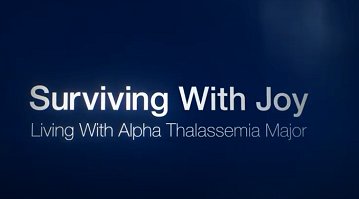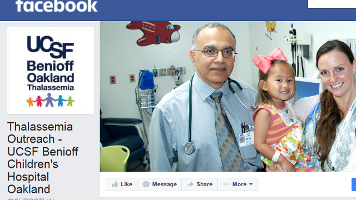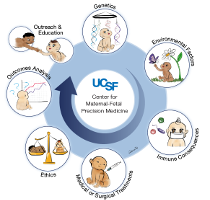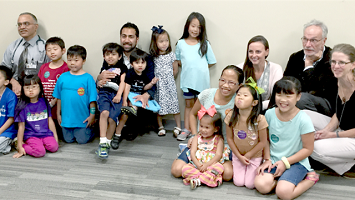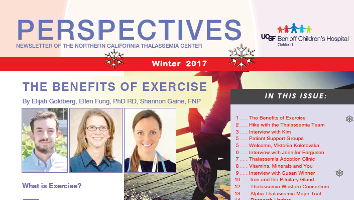Patient Stories
The Thalassemia Support Foundation Conference:
a Patient Perspective
by Perry Lai (Sept 2013)

Perry Lai
Last October, I attended the Thalassemia Support Foundation (TSF) conference at Children’s Hospital & Research Center Oakland (CHRCO). It was an enlightening and encouraging experience. I would like to share my perspective on the conference and its impact on me as a thalassemia patient.
TSF is a support group with the primary mission “to help improve the quality of life for all patients with thalassemia.” It was founded by patients and their friends and loved ones, one of whom is Paul DiLorenzo. Paul organized and spoke at the conference. While there are several support groups dedicated to thalassemia in the country, as I learned, TSF is particularly active in California and on the West Coast. Prior to attending this conference, I was not aware that this organization, or any other thalassemia support group, existed, so my recognition that there are people and entire organizations to support the thalassemia experience was itself an eye-opener.
The primary focus of this conference was on health, best practices in daily life, and how patients can best take care of themselves. As important as updating patients on medical research and current standards of practice is, the emphasis on lifestyle and the personal concerns of everyday living is refreshing and useful. Topics included the importance of a holistic approach to treating thalassemia; changes that thalassemia patients can expect to experience through their lifespan; achieving balance in daily life; and nutritional and exercise tips specific to thalassemia. I found the information regarding the effects of tea and vitamin C on iron absorption very helpful, and I have started pairing tea with my meals while avoiding high–vitamin C and high-iron foods at the same time. Since attending the conference, I have also started exercising regularly (for cardiovascular and bone health, which are particularly important for thalassemia patients). This was something I had planned on doing anyway, but the information presented at the conference convinced me and gave me the push to actually do it. The presentations at the conference gave attendees a unique opportunity to learn from highly trained professionals in thalassemia, including world-class expert Dr. Elliott Vichinsky, and I certainly walked away feeling intellectually stimulated and excited about the many ways I can live a healthier life.
As the presentations fed my mind, the panel discussion on coping with thalassemia fed my heart. The panel members were all people living with thalassemia and included Paul, who is the president of TSF, as well as CHRCO’s own Laurice Levine . The panel members related their experiences growing up with thalassemia and how they continue to manage their lives as people with the disease. Most have experienced the trials of blood transfusions and the consequent chelation therapy for iron overload. Until the advent of Exjade, they endured countless needle-sticks and gave over innumerable hours to Desferal therapy. Some talked about feeling different than “the other kids” as children or being left out of activities due to the inability to keep up physically. Some also talked about suffering episodes of severe illness. One of the panel members related his perspective on being a father to a child with thalassemia, giving care to her while also coming to terms with the reality that she has to manage a chronic disease starting at such a young age.
While we understand that people with chronic diseases have experienced challenges, we may not anticipate the resiliency and strength forged by a lifetime of meeting those challenges. Such cases, related by the panel, are inspiring. Thuy, a teenager with thalassemia, developed a love for swimming and swims for her high school team, despite not being able to keep up in PE in her earlier years. She also keeps a contagious smile on her face, as well as a sunny outlook on her future. Paul and Laurice have not allowed transfusions, chelation, and the vicissitudes of life to deter them from achieving great academic and professional success—both have earned graduate degrees and charted promising careers. Both have transcended their disease by dedicating themselves to improving life with thalassemia for the rest of us who have it. For Paul, this means his founding and running TSF; for Laurice, it is her work in research and education for CHRCO. Far beyond sharing a medical diagnosis, the members of this panel shared the experience of overcoming obstacles. They have embraced the challenges imposed by thalassemia, drawn lessons from their personal experiences, and applied the skills, strength, and wisdom found in those lessons to not only living healthier lives with thalassemia, but to life itself. Learning to work with needles and drugs, unpleasant as they may be, has become a skill of life. The attention and care given to one’s own body have become the discipline needed to meet one’s responsibilities. Health setbacks and disappointments have provided the training ground for cultivating tenacity and courage. Although I think of myself as fortunate for having a relatively mild form of thalassemia, the management of which is not nearly as intensive as that experienced by these panel members, I also believe that I have missed the opportunity to learn about myself in the reflection of thalassemia and to forge the kind of character that can only be achieved in the acceptance, and then transcendence, of disease. In my eyes, the panel members have accepted and transcended thalassemia, and I thank them for sharing their experiences and for their inspiration.
And I am inspired. The conference helped me make the decision to take better care of myself. Because I had not had direct or significant health problems since becoming an adult, I made the lazy assumption that my tussle with thalassemia was in the past and that I was not going to be affected in adulthood. After attending the conference and reading the literature I received, I now realize that I do have a higher risk for infections, blood clots, tissue damage from iron overload, osteoporosis, and even low testosterone. Fortunately, many of these risks can be managed with simple lifestyle practices, including exercise, diet and smart supplementation, daily aspirin, and extra vigilance to avoid getting sick. Iron overload is a problem that requires treatment by a physician, however, and attending the conference motivated me to finally start taking care of this problem after several years of moderately elevated iron levels. Even though I had not developed obvious signs of damage from excess iron, it is undeniable that simply waiting was not an optimal course of action, so I sought treatment from a hematologist in my city. Although my treatment has seen setbacks, in that it has not worked for me so far, I have learned much from this experience. I have learned that doctors—even specialists—are not always knowledgeable about thalassemia, and that we need to take responsibility for the management of our own care. We can be the bridge between the doctors who care for us where we live and the experts at CHRCO. Indeed, the issue of transition of care affects many adult patients and was another topic informatively discussed at the TSF conference.
Although my iron level is still high, I am not discouraged. I continue to be buoyed by the success of fellow thalassemia patients like Thuy, Paul, and Laurice and by the dedication and compassion in medical providers like Dr. Vichinsky and Nurse Practitioner Dru Haines, whose full support I know I have as I seek further treatment. It is a great relief to know that a smooth transition to adult care is possible and that the wonderful staff in the hematology clinic is committed to sharing knowledge and coordinating care with other doctors, in addition to conducting research and generating advances in practice. Irrespective of geography or age, the highest standard of care is available to us all. That is a powerful realization!
I feel lucky that I made the decision to attend the TSF conference. Not only did I learn useful tips and new findings on thalassemia, I met many extraordinary people, most of whom have thalassemia! They inspired me to take better care of myself and thus live more fully. It is interesting how life unfolds. A day spent with Paul and TSF has turned into something more—a new journey that is meaningful and hopeful. Should you have a chance to attend such a conference in the future, or to simply acquaint yourself with TSF, I encourage you to indulge in your curiosity and discover something new about thalassemia—and maybe even yourself.
--Perry Lai
